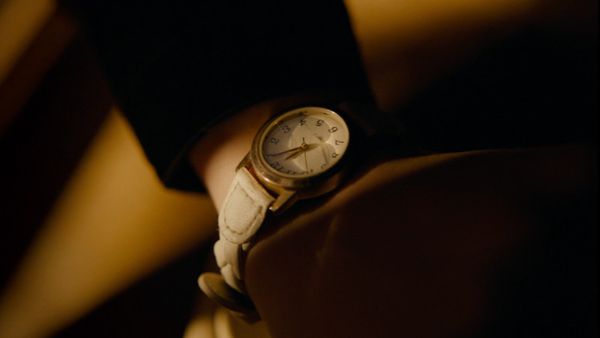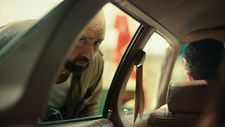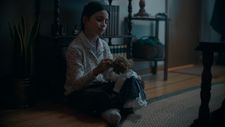 |
| Arshile Egoyan on Before They Joined Us: 'It's not obsessed with delivering a specific narrative. It leaves things to be questioned and interpreted' |
Before They Joined Us is drawn from your own mum's story, how did she react when you said that you wanted to sort of turn this into a short film that was based on her experience?
Arshile Egoyan: From the beginning, this was something that both my mother and I were really excited about. It's a deeply personal story for her. It's an important story for me. It's the story of my family and their coming here. The idea to turn it into a film formed as we had the conversation about what the story was. It became clear that there were really compelling moments, and the question was of how to organise those moments. The answer to that question came just as we were describing them. You know, there's a series of scenes that emerged, and it's something that could have been told as a feature, but there was a certain elegance to the drama that really lent itself to the short format. So the result is a short film that's impressionistic. It's not obsessed with delivering a specific narrative. It leaves things to be questioned and interpreted. But it was about conveying an emotional sense of insecurity.
It’s a film that's about exile in some ways, but not just exile from a place, but also exile from the children’s own beliefs because of what their aunt believes.
AE: That’s a very good point and there's this strange dissonance between the fact that these aunts are taking them in, they're protecting them from their reality in Lebanon and yet blocking them out from eternal salvation. It's like this very strange disconnect that they have to contend with. So again, it creates this atmosphere of insecurity. On the one hand, they have a roof over their head, which was not a given in Lebanon. But then there's something else that's threatened. So there's never that feeling of peace that one is hopeful that we get to experience, or that one is promised on some level.
You really capture that idea of death being a bit of a foreign concept to children, especially younger ones. The younger one can’t fully understand it and an existential threat that the world is ending is also very different from a child’s perspective. Was that something you wanted to tune into?
AE: Yes. I think for me, from the perspective of these children, both war and the end of the world are impossible to surmise. In Lebanon, they're at the centre of this conflict that they don't understand. The youngest one, literally, doesn't understand what it means to be shot in the head. For the older one, it doesn't make sense. It doesn’t make sense that there would be this chaos around them, because why would there be? And then to transplant that, it's the same thing that they encounter. It's this feeling that none of it makes sense, like, what does it mean that the end of the world is coming? Why would that be the case? Why are they threatened but their aunts seem protected? It's these questions that don't have answers, and I think as we grow older, we try to answer them, but they still don't make a lot of sense.
 |
| Arshile Egoyan on the car shots: 'What you're seeing, in terms of an environment, is actually a floor to ceiling screen. It's a wraparound screen' |
AE: I need to give all credit to our DoP Colin Cameron, who is a very, very tall man.He did it magnificently, and not without difficulty. He was extremely uncomfortable the entire shoot. But the thing that made it a bit more bearable was actually we used the volume to shoot the car scenes. So yes, he was in a car that we rented, it was a period car, but what you're seeing, in terms of an environment, is actually a floor to ceiling screen. It's a wraparound screen. So we got funding from the Canada Council of the Arts, which allowed for us to use an incredible facility, and made the shoot a lot more comfortable, because having that kind of control over the environment, over the light, and just not having to contend with the realities of an outdoor shoot in the back of a car, which would have made everything infinitely more difficult. It was a real luxury. So what that gave us was control. We could control exactly what we were getting in the shot. So the decisions, as far as light, how we introduced it, what it came to mean in different shots, we were able to articulate all of that in a way that we wouldn't have if we were at the mercy of the weather.
When it came to casting young stars, presumably you cast in Canada but the film is in Armenian, so I imagine that also presented a challenge.
AE: It was a really happy challenge. I was born in Toronto, Canada, Armenian by all accounts, and the film really gave my mother and I, but more so me, an opportunity to plug into the Armenian community here. We immediately accessed the Armenian High School, the Armenian communities and the Armenian Church, and really just disseminated a call to bring people who might be interested in it. The reality is that there aren't a lot of Armenian professional actors in Toronto. There are some very, very capable ones, and we were very lucky to be able to tap those people for the adult roles, but for the roles of the kids, it was a challenge, for sure. But again, we got lucky. We found two girls who were just terrific, and they had never acted in film, but really embraced the challenge and brought everything to it.
What does your mum think now that she’s seen it, because it must be slightly strange to look at a fragmented version of your own history?
AE: I think my mom is used to seeing herself in strange films. So yes, there was a personal element for sure, that really made it special for us. It was, I remember, yeah, when we first watched it as a family, it was in the basement. We had a screening, and everyone was just so excited to see this thing exist, and it's something that all three of us [including his dad, director Atom Egoyan] got to experience and have our own relationship to. It was a special moment.
I presume that you are not resting upon your laurels having got this short film made, and that you're already thinking about other projects. Can you tell me about any of those?
AE: Without going into specifics on the project itself, I'm attending the American Film Institute in Los Angeles. I finished my first year, and I'm going into my second as a screenwriter, and the work that I am developing there I'm very excited about, and that will be feature length.
Going forward do you see yourself more working on a script level than a directorial level? Or do you like the idea of doing the two?
 |
| Arshile Egoyan on his young stars: 'We found two girls who were just terrific, and they had never acted in film, but really embraced the challenge and brought everything to it' |
Is it the idea of writing more long form things that appeals to you going forward with television writing?
AE: I still read a lot but when I was young reading a book and putting it down and coming back to it the next day was a special thing, because it's this thing that lives with you over time. And when great television, for me, emerged, it had a similar effect. And I just thought that that was so compelling, because it's this way of telling a story that evolves and that we relate to in a way that's different than when we watch a film. When we watch a film, it's immediate, it's complete and it has an intended effect that is delivered. But with a book, it's more flexible in a way, and I think reveals more about us. And so that's what excites me about television as well.
Before They Joined Us will have its world premiere on September 9 at Scotiabank #3 at 9.15pm





















